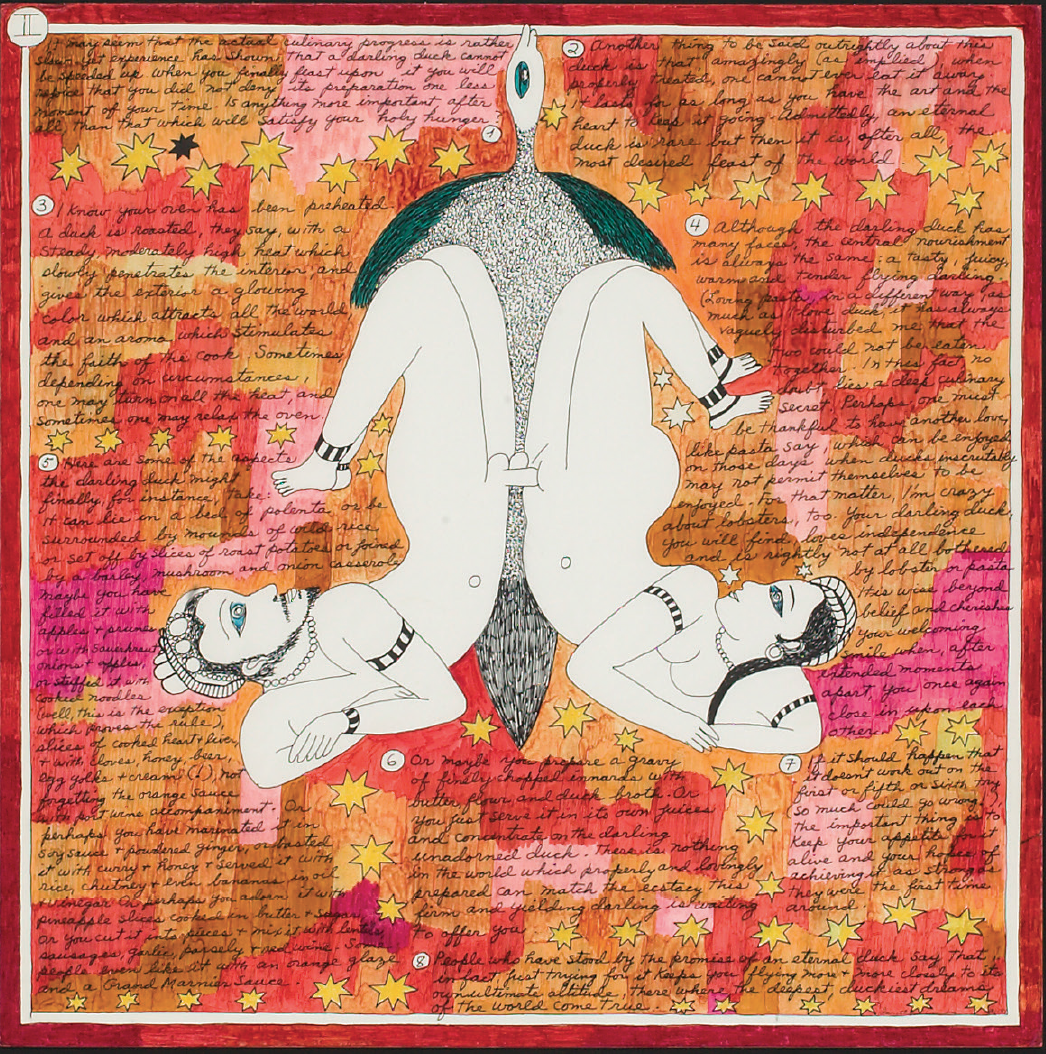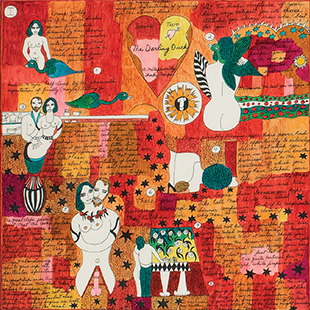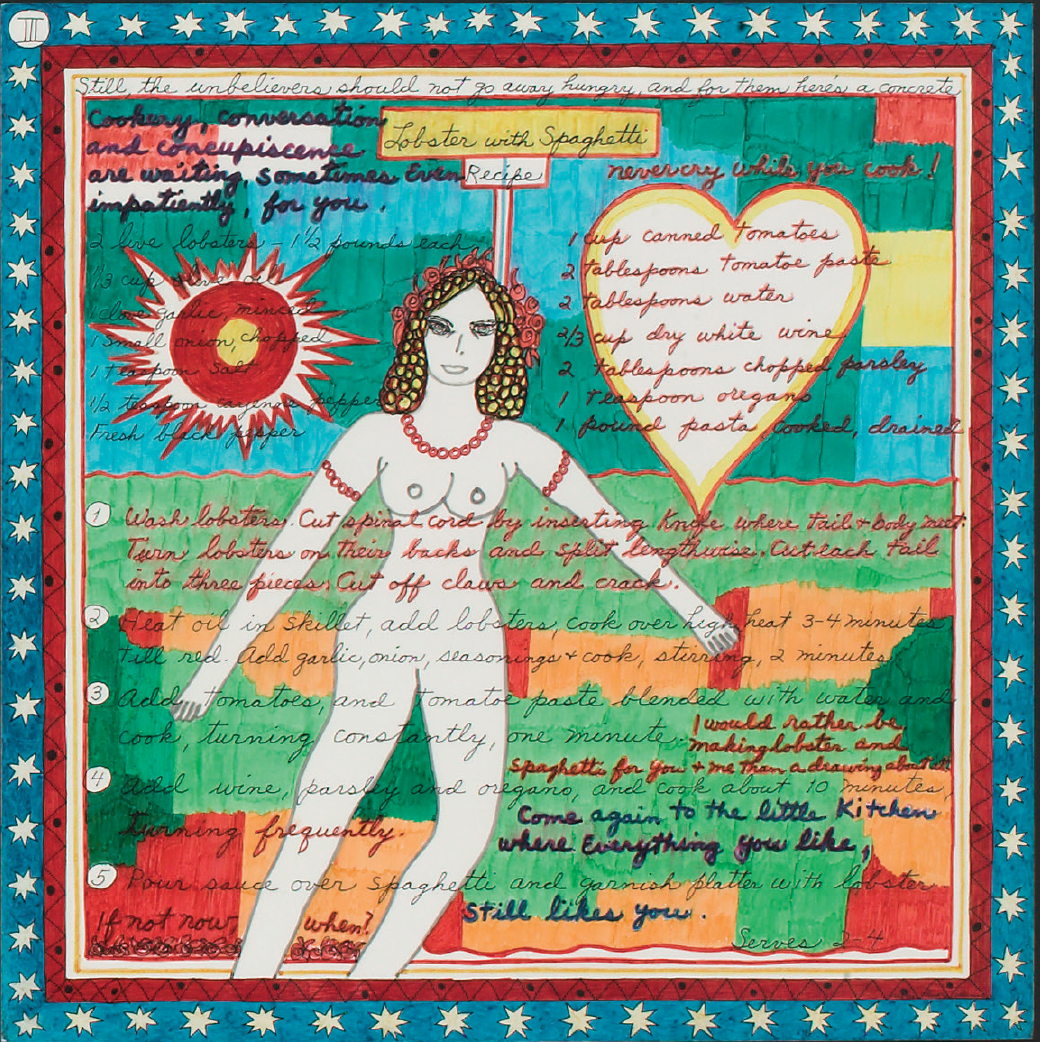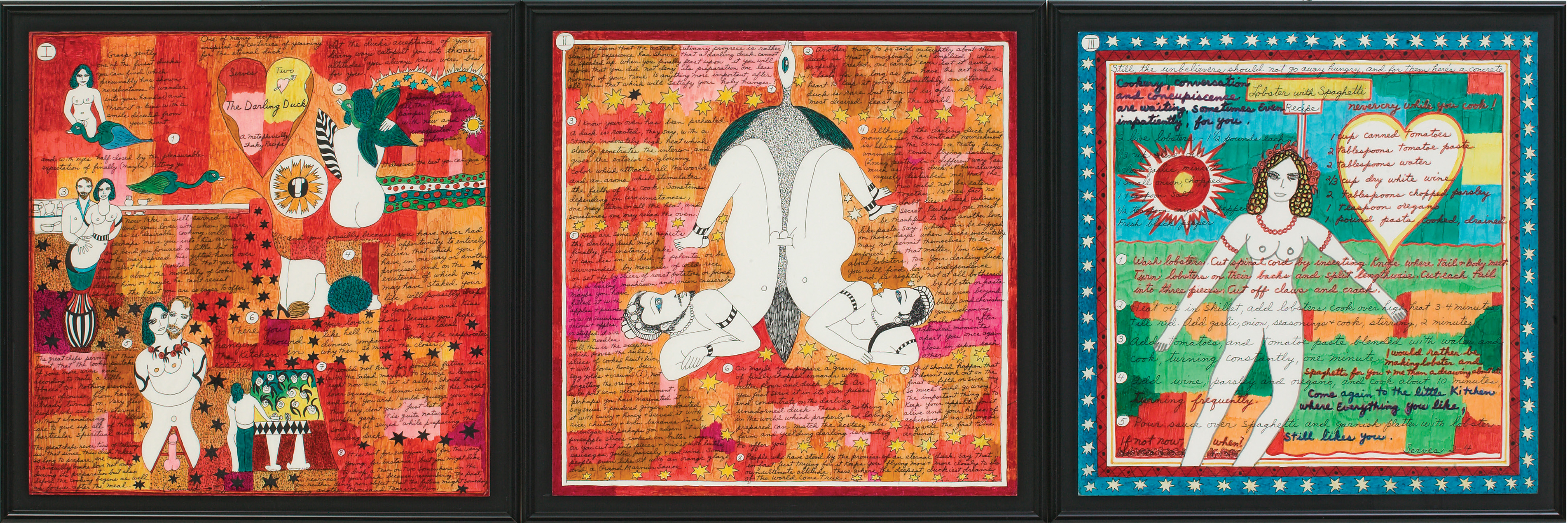"The Darling Duck" was published in Active Cultures’ Digest, Issue 01, November 2019.
Images: Dorothy Iannone, The Darling Duck, 1983/84. © photo Marc Domage Courtesy Peres Projects, Berlin and Air de Paris, Paris
__
Dorothy Iannone (b. 1933, Boston, Massachusetts) lives and works in Berlin, Germany. Recent solo exhibitions have been presented at venues including the Centre Culturel Suisse, Paris, France (2016); Migros Museum, Zurich, Switzerland (2014); Berlinische Galerie, Berlin, Germany (2014); Camden Arts Centre, London, England (2013); Palais de Tokyo, Paris, France (2013); the New Museum, New York City (2009); Kunsthalle Wien, Vienna, Austria (2006); and The Wrong Gallery, Tate Modern, London, England (2005). Iannone's work has been included in group exhibitions at institutions such as MAMCO, Geneva, Switzerland (2017); Museu de Arte de São Paulo (MASP), São Paulo, Brazil (2017); Hammer Museum, Los Angeles (2016); and Hamburger Bahnhof, Berlin, Germany (2015). Her work has been featured in major international exhibitions including the 2nd Athens Biennal, Athens, Greece (2009); Whitney Biennial, Whitney Museum of American Art, New York (2006); Berlin Biennial for Contemporary Art, Berlin, Germany (2005); Friends of Fluxus Exhibition, collateral event to the 48th Venice Biennale, Venice, Italy (1999); and Daniel Spoerri, Moulin des Jouissances, collateral event to the 37th Venice Biennale, Venice, Italy (1976).
Images: Dorothy Iannone, The Darling Duck, 1983/84. © photo Marc Domage Courtesy Peres Projects, Berlin and Air de Paris, Paris
__
Dorothy Iannone (b. 1933, Boston, Massachusetts) lives and works in Berlin, Germany. Recent solo exhibitions have been presented at venues including the Centre Culturel Suisse, Paris, France (2016); Migros Museum, Zurich, Switzerland (2014); Berlinische Galerie, Berlin, Germany (2014); Camden Arts Centre, London, England (2013); Palais de Tokyo, Paris, France (2013); the New Museum, New York City (2009); Kunsthalle Wien, Vienna, Austria (2006); and The Wrong Gallery, Tate Modern, London, England (2005). Iannone's work has been included in group exhibitions at institutions such as MAMCO, Geneva, Switzerland (2017); Museu de Arte de São Paulo (MASP), São Paulo, Brazil (2017); Hammer Museum, Los Angeles (2016); and Hamburger Bahnhof, Berlin, Germany (2015). Her work has been featured in major international exhibitions including the 2nd Athens Biennal, Athens, Greece (2009); Whitney Biennial, Whitney Museum of American Art, New York (2006); Berlin Biennial for Contemporary Art, Berlin, Germany (2005); Friends of Fluxus Exhibition, collateral event to the 48th Venice Biennale, Venice, Italy (1999); and Daniel Spoerri, Moulin des Jouissances, collateral event to the 37th Venice Biennale, Venice, Italy (1976).
Grasp gently one of the finest ducks you can find (which presumably has shown no reluctance to wander into your hands) and throw it a few kisses with a smile directed from your heart and eyes half closed by the pleasurable expectation of finally (maybe) letting go.
Let the duck's acceptance of your loving ways catapult you into those altitudes you always knew were best for you. Soaring higher all the time, pamper your duck with new and unexpected embraces.
Now take a well-earned rest. And your lover who is, for the purposes of this recipe, sometimes your lover and sometimes your duck, and with whom you are, as is desirable, cooking will perhaps move you into his arms and bend you forward a little bit so that he may spread his gifted hand over your alert ass. It could be that your remarks about the mortality of cooks delight him or maybe he can't resist sampling the feast you are so eager to offer. And you, possibly because you have never had the opportunity to entirely deliver that which you have, in one way or another, promised and on the existence of which you may have (almost) staked your life, will possibly drop to your knees and kiss your lover's shoes because you hope like hell that he is the ideal dinner companion. (And if he reciprocates, why then, so much the closer.) The great chefs never tire of telling us that, since this dish takes so long to prepare, one may tranquilly make love not only during its preparation but also before the cooking begins as well as forever after the meal.
So there you are, hanging around the kitchen in ecstasy. It would not hurt, for possible future use (with the salad, maybe) to squeeze a lemon right now and to set it aside. Should your lover squeeze the lemon with all his might and say, "You wish I would squeeze your ass this way, don't you," just let it go with a simple gasp. It is quite natural for the soul to be seized while preparing the darling duck.
It is not for everyone, not for the very young, for instance, but it would not hurt to drop a tear or two somewhere in the nearness of your duck because, remembering the past, you neither deny nor object that the future might someday bring another thousand tears or two.
It may seem that the actual culinary progress is rather slow. Yet experience has shown that a darling duck cannot be speeded up. When you finally feast upon it you will rejoice that you did not deny its preparation one less moment of your time. Is anything more important, after all, than that which will satisfy your hunger for heaven.
Another thing to be said outrightly about this duck is that, amazingly, (as implied), when properly treated, one cannot ever eat it away. It lasts for as long as you have the art and the heart to keep it going. Admittedly, an eternal duck is rare, but then it is, after all, the most desired feast of the world. I know that your oven has been preheated.
A duck is roasted, they say, with a steady moderately high heat which slowly penetrates the interior and gives the exterior a glowing color which attracts all the world, and an aroma which stimulates the faith of the cook. Sometimes, depending on circumstances, one may turn on all the heat and, sometimes, one may relax the oven. Although the darling duck has many faces, the central nourishment is always the same, a tasty, juicy, warm and tender flying darling. Loving pasta, in a different way, as much as I love duck, it has always vaguely disturbed me that the two could not be eaten together. In this fact, no doubt, lies a deep culinary secret. Perhaps, one must be thankful to have another love, like pasta, say, which can be enjoyed on those days when ducks inscrutably may not permit themselves to be enjoyed. For that matter, I'm crazy about lobsters, too. Your darling duck, you will find, loves independence and is, rightly, not at all bothered by pasta or lobster. It is wise beyond belief and cherishes your welcoming smile when, after extended moments apart, you once again close in upon each other.
Here are some of the aspects the darling duck might finally, for instance, take : it can lie on a bed of golden polenta or be surrounded by mounds of wild rice or set off by slices of roast potatoes or joined by a barley, onion and mushroom casserole. Maybe you have filled it with apples and prunes, or with sauerkraut, onions and apples, or stuffed it with cooked noodles (well, this is the exception which proves the rule), slices of cooked heart and liver and with cloves, honey, beer, egg yolks and cream (!), not forgetting the orange sauce with port wine accompaniment. Or, perhaps, you have marinated it in soy sauce and powdered ginger, or basted it with curry and honey and served it with rice, chutney and even bananas in oil and vinegar. Or perhaps you adorn it with pineapple slices cooked in butter and sugar, or you cut it into pieces and mix it with lentils, sausages, garlic, parsley and red wine. Some people even like it with an orange glaze and a Grand Marnier sauce. Or, maybe, you prepare a gravy of finely chopped innards with butter, flour and duck broth. Or you just serve it in its own juices and concentrate on the darling, unadorned duck.
There is nothing in the world which, properly and lovingly prepared, can match the ecstasy this firm and yielding darling is willing to offer you.
If it should happen that It doesn't work out on the first or fifth or sixth try (so much could go wrong!), the important thing is to keep your appetite for it alive and your hope of achieving it as strong as it was the first time around.
People who have stood by the promise of an eternal duck say that in fact, just trying for it keeps you flying more and more closely to its own ultimate altitude, there where the deepest, duckiest dreams of the world come true.
STILL, THE UNBELIEVERS SHOULD NOT GO AWAY HUNGRY. AND FOR THEM, HERE'S A CONCRETE LOBSTER WITH SPAGHETTI RECIPE:
2 live lobsters — 1 1/2 pounds each
1 cup canned tomatoes
1/3 cup olive oil
2 tablespoons tomato paste
1 clove garlic, minced
3 tablespoons water
1 small onion, chopped
2/3 cup dry white wine
1 teaspoon salt
2 tablespoons chopped parsley
1/2 teaspoon cayenne pepper
1 teaspoon oregano
Fresh black pepper
1 pound pasta, cooked, drained
1. Wash lobsters. Cut spinal cord by inserting knife where tail and body meet. Turn lobsters on their backs and split lengthwise. Cut each tail into three pieces. Cut off claws and crack.
2. Heat oil in skillet. add lobsters, cook over high heat 3-4 minutes until red. Add garlic, onion, seasonings and cook, stirring 2 minutes.
3. Add tomatoes, and tomato paste blended with water, and cook, turning constantly, one minute.
4. Add wine, parsley and oregano, and cook about 10 minutes, turning frequently.
5. Pour sauce over spaghetti and garnish platter with lobster.
Serves 2—4
![]()
![]()
![]()
Let the duck's acceptance of your loving ways catapult you into those altitudes you always knew were best for you. Soaring higher all the time, pamper your duck with new and unexpected embraces.
Now take a well-earned rest. And your lover who is, for the purposes of this recipe, sometimes your lover and sometimes your duck, and with whom you are, as is desirable, cooking will perhaps move you into his arms and bend you forward a little bit so that he may spread his gifted hand over your alert ass. It could be that your remarks about the mortality of cooks delight him or maybe he can't resist sampling the feast you are so eager to offer. And you, possibly because you have never had the opportunity to entirely deliver that which you have, in one way or another, promised and on the existence of which you may have (almost) staked your life, will possibly drop to your knees and kiss your lover's shoes because you hope like hell that he is the ideal dinner companion. (And if he reciprocates, why then, so much the closer.) The great chefs never tire of telling us that, since this dish takes so long to prepare, one may tranquilly make love not only during its preparation but also before the cooking begins as well as forever after the meal.
So there you are, hanging around the kitchen in ecstasy. It would not hurt, for possible future use (with the salad, maybe) to squeeze a lemon right now and to set it aside. Should your lover squeeze the lemon with all his might and say, "You wish I would squeeze your ass this way, don't you," just let it go with a simple gasp. It is quite natural for the soul to be seized while preparing the darling duck.
It is not for everyone, not for the very young, for instance, but it would not hurt to drop a tear or two somewhere in the nearness of your duck because, remembering the past, you neither deny nor object that the future might someday bring another thousand tears or two.
It may seem that the actual culinary progress is rather slow. Yet experience has shown that a darling duck cannot be speeded up. When you finally feast upon it you will rejoice that you did not deny its preparation one less moment of your time. Is anything more important, after all, than that which will satisfy your hunger for heaven.
Another thing to be said outrightly about this duck is that, amazingly, (as implied), when properly treated, one cannot ever eat it away. It lasts for as long as you have the art and the heart to keep it going. Admittedly, an eternal duck is rare, but then it is, after all, the most desired feast of the world. I know that your oven has been preheated.
A duck is roasted, they say, with a steady moderately high heat which slowly penetrates the interior and gives the exterior a glowing color which attracts all the world, and an aroma which stimulates the faith of the cook. Sometimes, depending on circumstances, one may turn on all the heat and, sometimes, one may relax the oven. Although the darling duck has many faces, the central nourishment is always the same, a tasty, juicy, warm and tender flying darling. Loving pasta, in a different way, as much as I love duck, it has always vaguely disturbed me that the two could not be eaten together. In this fact, no doubt, lies a deep culinary secret. Perhaps, one must be thankful to have another love, like pasta, say, which can be enjoyed on those days when ducks inscrutably may not permit themselves to be enjoyed. For that matter, I'm crazy about lobsters, too. Your darling duck, you will find, loves independence and is, rightly, not at all bothered by pasta or lobster. It is wise beyond belief and cherishes your welcoming smile when, after extended moments apart, you once again close in upon each other.
Here are some of the aspects the darling duck might finally, for instance, take : it can lie on a bed of golden polenta or be surrounded by mounds of wild rice or set off by slices of roast potatoes or joined by a barley, onion and mushroom casserole. Maybe you have filled it with apples and prunes, or with sauerkraut, onions and apples, or stuffed it with cooked noodles (well, this is the exception which proves the rule), slices of cooked heart and liver and with cloves, honey, beer, egg yolks and cream (!), not forgetting the orange sauce with port wine accompaniment. Or, perhaps, you have marinated it in soy sauce and powdered ginger, or basted it with curry and honey and served it with rice, chutney and even bananas in oil and vinegar. Or perhaps you adorn it with pineapple slices cooked in butter and sugar, or you cut it into pieces and mix it with lentils, sausages, garlic, parsley and red wine. Some people even like it with an orange glaze and a Grand Marnier sauce. Or, maybe, you prepare a gravy of finely chopped innards with butter, flour and duck broth. Or you just serve it in its own juices and concentrate on the darling, unadorned duck.
There is nothing in the world which, properly and lovingly prepared, can match the ecstasy this firm and yielding darling is willing to offer you.
If it should happen that It doesn't work out on the first or fifth or sixth try (so much could go wrong!), the important thing is to keep your appetite for it alive and your hope of achieving it as strong as it was the first time around.
People who have stood by the promise of an eternal duck say that in fact, just trying for it keeps you flying more and more closely to its own ultimate altitude, there where the deepest, duckiest dreams of the world come true.
STILL, THE UNBELIEVERS SHOULD NOT GO AWAY HUNGRY. AND FOR THEM, HERE'S A CONCRETE LOBSTER WITH SPAGHETTI RECIPE:
2 live lobsters — 1 1/2 pounds each
1 cup canned tomatoes
1/3 cup olive oil
2 tablespoons tomato paste
1 clove garlic, minced
3 tablespoons water
1 small onion, chopped
2/3 cup dry white wine
1 teaspoon salt
2 tablespoons chopped parsley
1/2 teaspoon cayenne pepper
1 teaspoon oregano
Fresh black pepper
1 pound pasta, cooked, drained
1. Wash lobsters. Cut spinal cord by inserting knife where tail and body meet. Turn lobsters on their backs and split lengthwise. Cut each tail into three pieces. Cut off claws and crack.
2. Heat oil in skillet. add lobsters, cook over high heat 3-4 minutes until red. Add garlic, onion, seasonings and cook, stirring 2 minutes.
3. Add tomatoes, and tomato paste blended with water, and cook, turning constantly, one minute.
4. Add wine, parsley and oregano, and cook about 10 minutes, turning frequently.
5. Pour sauce over spaghetti and garnish platter with lobster.
Serves 2—4




